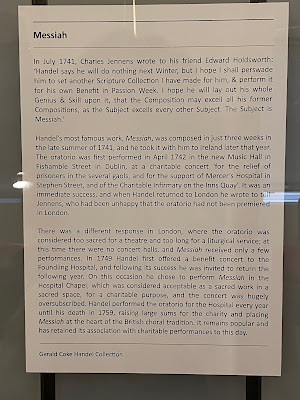 |
| A sampler of the Hospital by a child from the area |
Gerald Coke (1907-1990) created an extensive Handel collection over sixty years and donated it to the Foundling Museum, where it has its own floor and locked storage area. This includes more than 14,000 items from the eighteenth century to the present, ranging from Handel’s will to manuscript and printed music and documents, books, journals, libretti, sound recordings, artworks and artifacts, and performance ephemera relating to Handel and his circle. His collection includes my grandfather’s book on Handel although it is not sold in the gift shop (which I will point out in due time to the management).I enjoyed the Museum, although it does not pretend these children received more than the bare necessities, and the Handel area provided an interesting contrast to the Handel & Jimi Hendrix Museum in Mayfair my mother and I visited four years ago. I would have stayed longer if I hadn’t been so thirsty (which I may also point out to them). I found water next door to Skoob Books, a second-hand bookstore in the area I had always wanted to visit. It had some interesting things but not the book I wanted, Rich Desserts and Captain's Thin by Margaret Forster. Next, I went to the Waterstone’s on Gower Street, across the street from the hotel I stayed at on my last visit (my current dorm room is small but not as claustrophobic as the Arosfa). This bookstore has the best mystery section of any place I have visited since the demise of my beloved Black Orchid in New York. I was very tempted but managed to buy just one book before repairing to the ground floor for tea. I ordered a Raspberry and Almond Bakewell bar and the café staff gave me two – I must have looked as if I’d had a bad day!
Soon it was time to find a bus back to the West End. I went to Tavistock Square with plenty of time but due to the strike all the buses were full of angry rush hour commuters and they kept going past my bus stop. Finally, I just got on the first bus that stopped for passengers and was lucky that it took me to the Duchess Theatre for The Play That Goes Wrong. I had tried to interest others in my group to join me as £23 seemed very reasonable. The premise is that an amateur drama society is putting on a 1920s murder mystery but, as the title suggests, everything goes wrong from props to missed lines to the collapse of the sets. I don’t care for slapstick humor but the perfectly timed comic delivery of the cast made it very enjoyable. The cast also appreciated that it hadn’t been easy to get there and thanked us at the end. And I got a 139 bus right home!Miles walked: 4.9
Books acquired: just one
Books acquired: just one






Many years ago, my husband and I left our young children in the Coram's Fields playground - an enclosed secure space 'for children only' - and we went to the Dickens Museum.
ReplyDelete